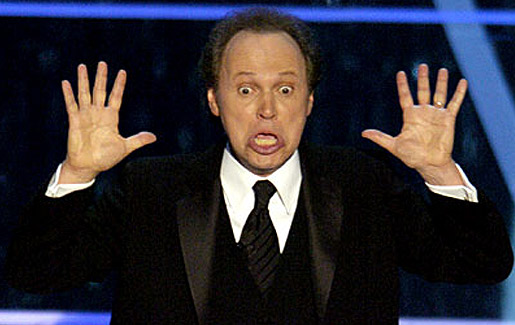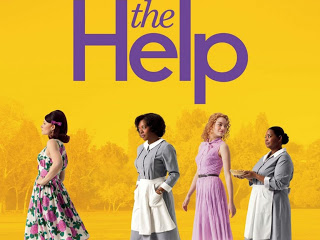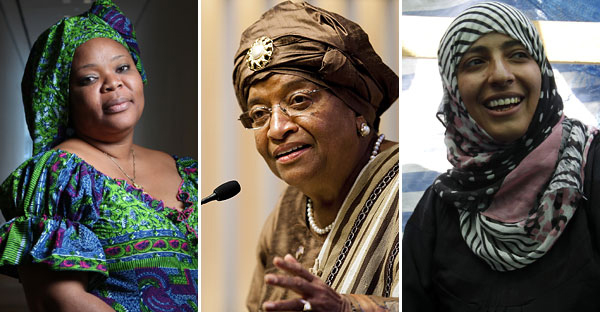 |
| Billy Crystal: He’s gilded and swooping in to save the 2012 Oscars |
I’m one of those old-fashioned people who enjoys watching the Academy Awards every year. Movies, spectacle, the opportunity to throw a party complete with Oscar Bingo and a contest to see who can best predict the winners — I love it for all of these reasons. Even knowing that the awards are essentially a political campaign, in which the studios/production companies/actors with the most money (and thus the most visibility and power) typically win, and even though the films/performances that I’m rooting for are often not even nominated, there’s still something important about the show (I’ve previously talked about why
here): it reminds us of the film industry’s power structure and what kinds of films are supposed to be culturally important.
Let me be more specific. The
New York Times ran a piece titled
“Billy Crystal Is Gilded as Hero of Oscar Night” which discusses the Governors Awards ceremony, held on Saturday, November 12th, honoring the Jean Hersholt Humanitarian Award winner and honorary Oscar winners (which were previously part of the televised ceremony, but removed this year to “to speed up the telecast and give more personal attention to their winners). Because we wouldn’t want to take televised time to honor people who have made a significant contribution to film, or anything,
am I right?But what dominated the piece — and the ceremony, if we can trust what Michael Cieply wrote — is the fact that Billy Crystal is now hosting the Oscar Ceremony. Or, as the article states, he “swooped in to save the Academy Awards.” Um, okay. I imagine it was just like that.
See, you might have missed it (if you don’t closely follow these things), but the person producing the show this year, Brett Ratner,
said some pretty awful things, and when he resigned, the person he’d picked to host — Eddie Murphy — decided he would follow suit and pulled out of the gig. A new producer was selected, and he chose Billy Crystal, who has hosted the show eight previous times.
Am I old-fashioned, or is that simply how I’m made to feel by the Academy?
Now, I have nothing against Billy Crystal. He seems like an overall pretty good guy, and I enjoyed
When Harry Met Sally back in 1989, and thought
City Slickers was pretty good back when I was eleven years old. I know he’s been in movies since then, but he’s not really on my personal radar as a Current Film Star. (Neither is Eddie Murphy for that matter, though I think he would’ve proven at least an interesting host, and would have improved on
the Academy’s abysmal track record of including African Americans — at any capacity — in the program.)
Back to that “old fashioned” idea. This year, the Academy at least showed its awareness that younger people were often alienated by the show when they shrewdly hired James Franco and Anne Hathaway as hosts, a move that backfired, mostly due to Franco phoning it in (I can’t be the only one sure he was stoned) and Hathaway trying her best to make up for her near-comatose co-host. According to the NYT article,
That it should be Mr. Crystal who saved the day met little disapproval from those who gathered on Saturday night, even if it means that the Academy’s quest for youth and a more diverse audience will yield once more to a neo-vaudevillian who is often compared here to Bob Hope, who holds the record as the 19-time host of the show.
Maybe I’m not old-fashioned; maybe I’m stupid for continuing to tune in to programming that doesn’t give a damn whether I watch or not. Or, even worse, maybe they’re just assuming they have “female viewers” (because we’re a silly monolith) because, you know, OMG Pretty Dresses.
 |
| Oprah Winfrey wins the Jean Hersholt Humanitarian Award |
There’s something else, though, that I can’t not notice about the
NYT article: In the entire 1,187-word article, only about 200 words (3 paragraphs) were devoted to one of the highest honors and most controversial moments of the night: Oprah Winfrey winning the Jean Hersholt Humanitarian Award. She’s the first Black woman to win the award (Quincy Jones won in 1995, the only Black man to win it), yet her win has been called “boneheaded” and “a shameless bid for a ratings boost,” largely because her contributions to the film industry are seen by insiders as lacking. Further,
according to NWFCC chair Armond White,
Is the Academy kowtowing to the silly complaints that no black actors were nominated this year?” says White. “The Oscars are supposed to be about the works Hollywood admires, not a score-keeping mechanism for ethnic and racial equality. By that standard the Oscars fail Native Americans, Asians, Africans, Scandinavians, and Latin Americans every year. I’m afraid those complaints were just media hype, an attempt by some to hold the Oscars hostage to political correctness.
Yes, the Oscars do fail African Americans, Native Americans, Latin Americans, and many more marginalized groups every year. But it isn’t “political correctness” at work in pointing out these gross injustices. It’s a privileged group of people (members of The Academy) who willfully ignore contributions in film by people of color–especially women of color–and an industry operating with a severe case of institutionalized racism.
The night’s other two winners, James Earl Jones and Dick Smith, got two paragraphs and one paragraph, respectively, in the NYT piece. Jones has appeared in over 50 films, yet is even more of an afterthought than Winfrey.
So, what does this single article tell us about the Academy, the Oscar Awards, and the New York Times?
Do I really need to spell it out?








